| Budget Budge Benefits
Building
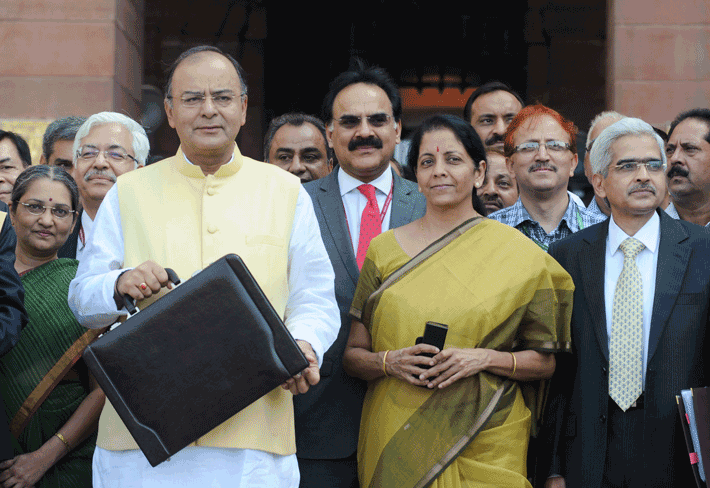
The Union Minister for Finance, Corporate
Affairs, and Defense Arun Jaitley, ready for the presentation of the
Union Budget in Parliament. On his left is the Minister of State for
Commerce and Industry (Independent Charge), Finance and Corporate
Affairs, Nirmala Sitharaman. |
Newly elected Prime
Minister Narendra Modi’s government completed its first test: far
from being populist, the government will concentrate on setting up or
enhancing infrastructure.
At least that is what resulted from the
annual Railway Budget and the Union Budget for 2014 (while the Railway
Budget presented by the Railway Minister contains the allocation of resources
for future projects in the Indian Railways—the country’s largest
state-owned enterprise—the Union Budget contains the government’s
revenue and expenditure for a fiscal year that begins on April 1 of the
present year to March 31 of the next year; it is placed in Parliament
by the Finance Minister).
Infrastructure
Wish Lists
Heralded as the most important economic
event in the country, chambers of commerce and other associations make
their wish lists long before the Budget is announced and hope that the
Finance Minister will incorporate their demands.
This time around, while the cargo stakeholders
did not actually present their requests to Finance Minister Arun Jaitley,
many voiced concerns about the lack of infrastructure.
In fact, the cries for infrastructure improvement
and enhancement may have sounded a tad repetitive, but they have simply
carried on because this government was voted in on promises to bring in
“achche din" (good days or better times).
Business
Speaks
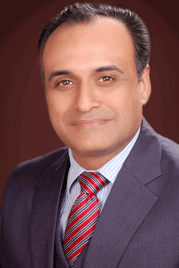 Regional Vice President, Indian Subcontinent and Managing Director, India
of UTi Worldwide, India, Sameer Khatri spoke plainly: “Our ports,
our roads, our airport infrastructures are in need of immediate improvement.
Regional Vice President, Indian Subcontinent and Managing Director, India
of UTi Worldwide, India, Sameer Khatri spoke plainly: “Our ports,
our roads, our airport infrastructures are in need of immediate improvement.
“We do see a fair amount of work being
done to upgrade the airport infrastructure in the metros—that is
a welcome sign.
“However, we do not see that kind
of an initiative being taken on the port infrastructure, which is quite
a worry as there is a huge shift from air business to ocean.
“I think it is important to upgrade
our infrastructure to cater to the growth happening in the ocean business.”
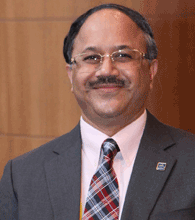 Khatri
is not alone. One of the country’s veteran freight forwarder and
Customs brokers, Shantanu Bhadkamkar (right), he was immediate Past President
of FFFAI–the Federation of Freight Forwarders' Associations in India
and recently appointed Chairman of the International Federation of Customs
Brokers Association–IFCBA was more forthright. Talking to FlyingTypers,
Bhadkamkar offers a reality check regarding the country’s urgent
need for good infrastructure. Khatri
is not alone. One of the country’s veteran freight forwarder and
Customs brokers, Shantanu Bhadkamkar (right), he was immediate Past President
of FFFAI–the Federation of Freight Forwarders' Associations in India
and recently appointed Chairman of the International Federation of Customs
Brokers Association–IFCBA was more forthright. Talking to FlyingTypers,
Bhadkamkar offers a reality check regarding the country’s urgent
need for good infrastructure.
“Planning needs to be 10 years ahead
of the international quality standards, 10 years ahead of the estimated
capacity requirements at the time of the execution.”
He also said that the infrastructure should
be made available at competitive prices while rendering top class service.
“That isn't a tall order,” Mr.
Bhadkamkar insists. “It is something every single successful economy
has done.
“The ability to compete, to realize
our potential and to be competitive in the global marketplace is the least
we should expect as transportation fuels growth.
“Today, our entire infrastructure
is used beyond its capacity.”
Other
Voices
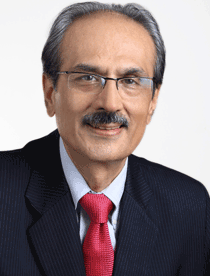 Another
person who expected more from this year’s Budget was Bharat Thakkar
(right). Another
person who expected more from this year’s Budget was Bharat Thakkar
(right).
The immediate past President of the Air
Cargo Agents Association of India (ACAAI) and a veteran freight forwarder,
he had made an impassioned plea to the new government to set right the
wrongs that have plagued the cargo and logistics sector.
He said that the cargo industry should have
been given ‘Industry’ status—a demand that has been
pending for a long time—to enable it to access capital to upgrade
the physical infrastructure to international standards and bring down
operating costs to benefit the export-import trade.
As an important player in air cargo, Thakkar
pointed out that “a cargo facility was an window that showcased
the capability of a country’s economy.” The PPP model, according
to him, was a turning point in the history of India’s economic growth,
especially in airports.
The significant changes enabled by the PPP
model have upgraded the passenger facilities, but it should not have been
done “at the cost of and at the neglect of cargo facilities.”
Thakkar has virtually been waging a lone
battle to ensure a better deal for air cargo from the government.
He underscored an obvious point: in India
today, there are no benchmarks for critical services, including the performance
of Airport Custodians.
“From the time a flight touches down
to the physical removal of cargo, Custodians should be provided with a
time frame for completion of every activity and there should be accountability
(including financial accountability) for any delay in clearance of cargo,”
he demanded.
The government was well aware of the issues
faced by the cargo and logistics industry,” he insisted.
“The new regime of Narendra Modi is
obliged to correct the wrongs,” Thakkar said.
One of the major ‘wrongs’—and
that lies at the doorstep of the Finance Minister, since he heads the
department that has controls over the Customs—was the slow, erratic,
and often non-functional ICEGATE system (the Indian Customs Electronic
Commerce/Electronic Data Interchange—EC/EDI—Gateway).
The Indian Exim trade faces serious challenges
from the global market and must be spared from delays at airports due
to shortage of staff and frequent ICEGATE System breakdowns, Thakkar concluded.
|  Nearly
everybody in transportation carrying cargo anywhere in India looks
(or at least hopes) for “achche din,” which that translates
to “good days or better times” in Hindi. A new government
under Prime Minister Narendra Modi has promised to enahnce the sorely
lacking airport and infrastructure. Nearly
everybody in transportation carrying cargo anywhere in India looks
(or at least hopes) for “achche din,” which that translates
to “good days or better times” in Hindi. A new government
under Prime Minister Narendra Modi has promised to enahnce the sorely
lacking airport and infrastructure.
But stakeholders have heard all of
this before and are taking a “show me the money” view.
|
Nearly everybody in transportation carrying cargo
anywhere in India looks (or at least hopes) for “achche din,”
which that translates to “good days or better times” in Hindi.
A new government under Prime Minister Narendra Modi has promised to enahnce
the sorely lacking airport and infrastructure.
But stakeholders have heard all of this before and are taking a “show
me the money” view.
ATF
Fluctuations
 Other
than the complaints about infrastructure, the government has yet to act
on the rising ATF costs. Other
than the complaints about infrastructure, the government has yet to act
on the rising ATF costs.
Perhaps, it is only in India that the price
of ATF varies from state to state within the country (thanks to the various
taxes imposed by the states).
Said Reiner A. Allgeier, Managing Director,
(left) Schenker India Private Limited:
“As a service provider, we expect
the government to work on fuel prices—a direct proportion of logistics
cost, to bring India under a uniform tax regime, make provisions for necessary
infrastructure development for transport, and encourage economic zones
for optimized growth.
“The logistics sector is a backbone
industry for the economy, and needs elightened policies and measures adopted
by the government.”
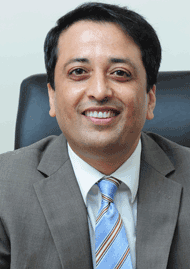 Samar
Nath, (right) CEO, DHL Global Forwarding, was optimistic. Nath said that
the “government’s emphasis on economic development is a welcome
step in the right direction. Samar
Nath, (right) CEO, DHL Global Forwarding, was optimistic. Nath said that
the “government’s emphasis on economic development is a welcome
step in the right direction.
“For any progress to take place, it
is essential to have a robust logistics and supply chain industry, which
will support the growth aspirations of the government.
“A serious focus on development of
infrastructure, i.e. cold storage, ports, airports, and road construction,
is required, with these projects being closely monitored, to ensure timely
completion of the same,” Nath said.
Financial
Assurances?
Other than the emphasis on creation of new airports
by the government, what has given rise to “better times” is
the assurance given by Finance Minister Jaitley that his ministry would
work to implement GST (Goods and Service Tax) around the country. (The
country still does not have a uniform GST, and freight transported from
one to any of the 29 states of India are subject to taxes.)
Samar Nath notes: “The implementation
of GST within a timeframe will go a long way in the re-structuring of
supply chains, which will eventually lead to an increase in trade for
the country.”
UTi’s Sameer Khatri is equally vocal:
“GST is going nowhere,” he said.
“While we do see the fact that there
are a lot of Inland Container Depots and Container Freight Stations mushrooming
across the country, connectivity is something which is missing.
“We are putting the cart before the
horse. There is definitely a need to look at the situation in a more seamless
manner to make them successful as an entity,” he advised.
“If you are creating infrastructure
to facilitate business and if you don’t bring in the connectivity
for a seamless service, then you are doing a disservice to the industry.”
Tirthankar Ghosh
|






